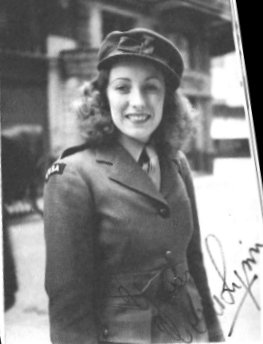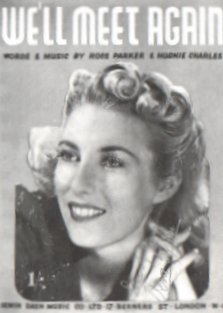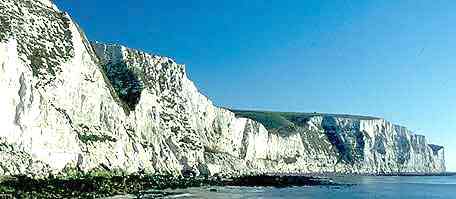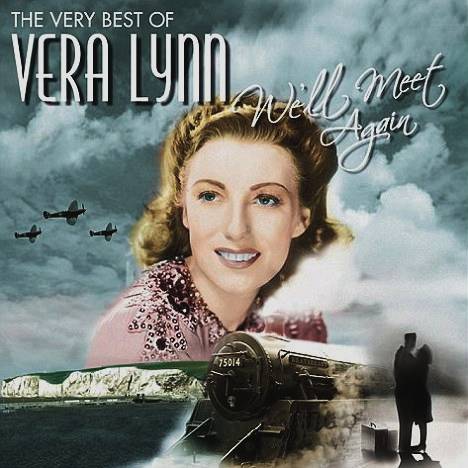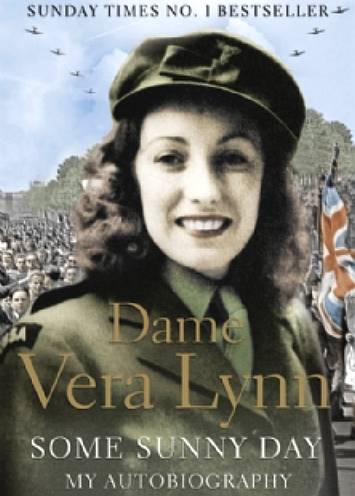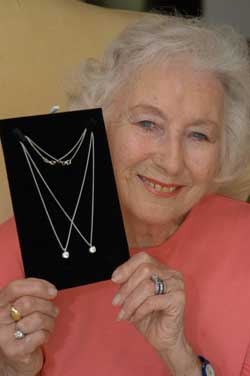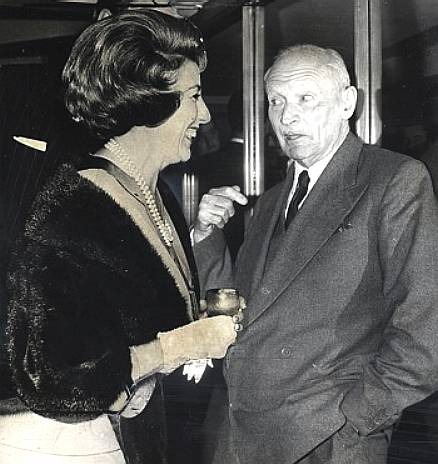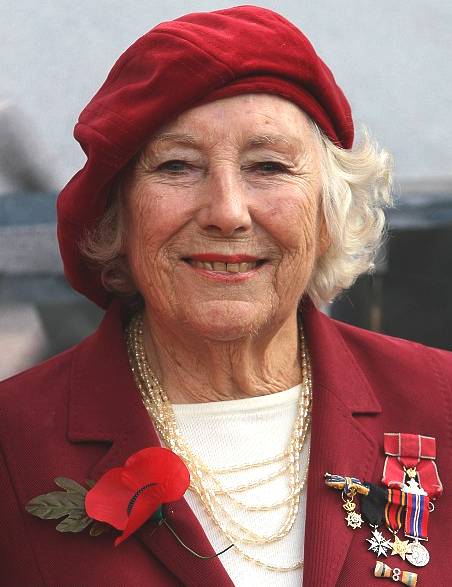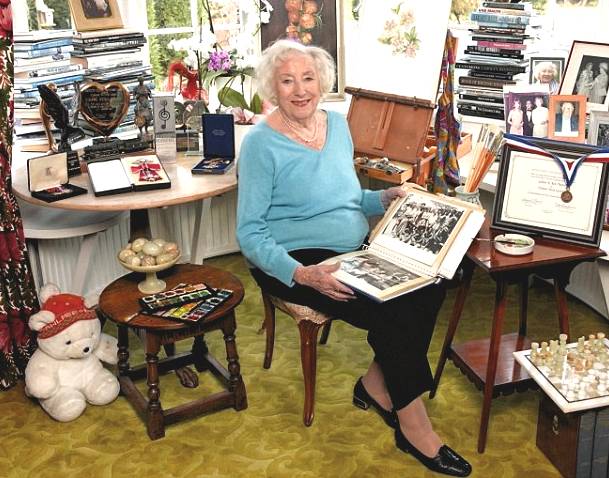|
DAME VERA LYNN - BLUE BIRDS
|
|
|
Born in London in 1917, Vera Lynn started her singing career as a young girl and became one of the most famous voices of World War II. She hosted a BBC radio show called "Sincerely Yours" from 1939, and her morale-boosting songs were a favourite among all British servicemen. Vera's most popular song was "We'll Meet Again", however she also put Dover firmly on the cultural map with her spirit-lifting ballad "There'll be Blue Birds over the White Cliffs of Dover", a song which is known the world over. In 1976, Vera Lynn was made a Dame.
Vera Lynn, the 'Forces Sweetheart'
Vera Lynn was born Vera Margaret Welch on 20 March 1917 in East Ham, in what was then the county of Essex, now East London. When she began performing publicly at the age of seven, she adopted her grandmother's maiden name (Lynn) as her stage name. Her first radio broadcast, with the Joe Loss Orchestra, was in 1935. At this point she was being featured on records released by dance bands including those of Loss and of Charlie Kunz. In 1936 her first solo record was released on the Crown label, "Up the Wooden Hill to Bedfordshire". This label was absorbed by Decca Records in 1938. After a short stint with Loss she stayed with Kunz for a few years during which she recorded several standard musical pieces. In 1937, she moved to the aristocrat of British dance bands, Bert Ambrose.
DOVER'S WHITE CLIFFS
The 100-metre high White Cliffs of Dover require no introduction. These icons of England have been the sign of home for travelers over the centuries, immortalized during the Second World War in Dame Vera Lynn’s song ‘There’ll be Blue Birds over the White Cliffs of Dover’. Both Shakespeare and Wordsworth wrote about the cliffs, their beauty and their role in the nation’s identity.
There'll
be blue birds over There'll
be love and laughter The
shepherd will tend his sheep, There'll
be blue birds over
Words
- Nat Burton
The White Cliffs look better from a distance. Indeed, the greater the distance the better it would seem. Nat Burton, the lyricist of their most celebrated song, who improbably put 'blue birds over the white cliffs of Dover', was an American who had not been within 3,000 miles of the place. But reality never bothered a good myth. The cliffs loom larger, whiter, and sturdier in the imagination than they do in fact.
'(There`ll Be Bluebirds Over) The White Cliffs of Dover' is one of the most famous of all the World War II era pop classics. It became a sensational hit in 1942, as it reflected the feelings of all the Allies towards the British people in their brave fight against Hitler. Originally released in the U.S. by bandleader Kay Kyser, four other artists also hit the top 20 with this song that year: Glenn Miller, Sammy Kaye, Jimmy Dorsey and Kate Smith. The most well known version of the song on this side of the Atlantic is probably the one recorded by Vera Lynn in 1942. Other artists who've recorded this standard include: Connie Francis, Bing Crosby, Jim Reeves, and The Righteous Brothers. In June 1995 Robson and Jerome’s version went to No. 1 in the UK in a medley with “Unchained Melody”.
Vera Lynn started to sing by Joe Loss, but started her real career by Charlie Kunz. In her autobiography she said: "After a few weeks after my radio broadcastings with Charlie Kunz, I made also a few records with the Casani Club-orchestra directed by Charlie. The first one "I'm in the mood for love", a beautiful song of Jimmy McHugh and Dorothy Fields from the movie called "Every Night at Eight" (1935). It was not a top hit, but it stays a evergreen".
Vera Lynn, the 'Forces Sweetheart' - Album cover and Autobiography
Her most famous song must be "We'll meet again", which was written by Ross Parker and Hughie Charles in 1939 and sung in the movie of the same name, in which Vera starred in 1942. She first sang the song in 1939 while touring with the Ambrose Orchestra. The movie was produced by Ben Henry and his associate, George Formby. George was a singer and movie actor and comedian in his own right.
Vera Lynn made two more movies, Rhythm Serenade (1943) and One Exciting Night (1944). While the first movie was basically her own lifestory, of a dancer who becomes a radio star, in Rhythm Serenade she played the 'girl next door' in a comedy, while One Exciting Night sees her in a dramatic role about art thieves. She sings in all three films.
In 1989, together with Robin Cross and Jenny de Cress, Dame Vera Lynn published a 'personal and social history of World War Two' (softback 1994, ISBN 0-283-06233-9), from which these pictures and some quotes have been taken. The book may be a bit hard to find, try Amazon UK.
WE'LL MEET AGAIN
We'll
meet again, Keep
smiling through So
will you please They'll
be happy to know
The audio file downloading will take some time (about 300 k) The song was featured on the Pink Floyd LP "Another Brick in the Wall". If you can't hear the embedded .wav file please click here, or to listen to a midi version click here.
DAME VERA LYNN’S DIAMOND DAY
SECOND WORLD WAR forces sweetheart Dame Vera Lynn helped the Army Benevolent Fund (ABF) promote its latest fundraising event by modeling a specially commissioned diamond necklace that must be won.
To mark D-Day and the ABF’s 60th anniversary, two specially commissioned diamond necklaces worth £10,000 each will be won by two lucky people who attend “Music on Fire!” the ABF’s latest fund raising event to be held at the Royal Military Academy, Sandhurst on the 9th and 10th July.
Produced
by Major Sir Michael Parker KCVO CBE who organised HM The Queen’s
Golden Jubilee Celebrations outside Buckingham Palace, “Music on
Fire!” is his latest event, which he says will be the “Greatest Show
of Them All.”
The one carat diamonds are fully certified and have been donated by an anonymous benefactor and tickets will be sold at the event on both nights.
The Army Benevolent Fund, the Army’s National Charity, was founded in 1944 shortly after D-Day when it provided support for the 4.5 million men and women who had served their country during the Second World War as they returned to civilian life. Its objective in its 60th year is to raise the profile of the organisation, as well as raise much needed funds in order to continue providing assistance to serving and retired members of the Army.
Today the Fund remains strongly committed to the welfare of soldiers, former soldiers and their families, providing substantial grants to those in times of real need. Last year it helped more than 150,000 people.
Although those for whom the Army Benevolent Fund was originally set up for are getting older, there are still more than 300,000 war widows and pensioners eligible for assistance from the Fund.
18 FEBRUARY 2009
The 91-year-old is said to be 'furious' after the BNP used the song, and another of her classics 'All Alone in Vienna', on the CD.
Vera Lynn with Field Marshall (Monty) Montgomery in 1963 and in 2011, wearing the diamond brooch (lower right)
25 NOVEMBER 2011 - DIAMOND BROOCH GOES MISSING
Studded with diamonds, the brooch was presented to Dame Vera Lynn by Field Marshal Montgomery as a thank you for her efforts in boosting his troops’ morale.
Dame Vera at home in her 'painting' room aged 94, Ditchling, Sussex
RECORDING CAREER
Vera Lynn made her solo recording debut with the song "Up The Wooden Hill To Bedfordshire" in February 1936. The 9" 78rpm single was issued on the Crown Records label, which went on to release a total of 8 singles recorded by Vera Lynn and Charles Smart on organ. Early recordings include "I'm in the Mood for Love" and "Red Sails in the Sunset".
On 13 September 2009 Lynn became the oldest living artist to make it to No. 1 in the British album chart, at the age of 92, passing such veterans of music as American jazz trumpeter Louis Armstrong and French singer Charles Aznavour. Her collection We'll Meet Again: The Very Best of Vera Lynn entered the chart at number 20 on 30 August, and then climbed to number 2 the following week, before reaching the top position, outselling both the Arctic Monkeys and the Beatles. In its third week the album went gold with sales of over 100,000.
LINKS
http://www.dailymail.co.uk/femail/article-2098670/Dame-Vera-Lynn-94-relaxes-painting-room-Sussex-home.html http://en.wikipedia.org/wiki/Vera_Lynn http://www.telegraph.co.uk/news/politics/4687730/Dame-Vera-Lynn-takes-on-BNP-over-White-Cliffs-of-Dover.html http://www.hellomagazine.com/celebrities-news-in-pics/07-09-2009/52206/ Devastation-Dame-Vera-Lynn-loses-brooch-given-Field-Marshal-Montgomery
Bertelsmann | SonyBMG | BMG Strategic Marketing Group | BMG Music Service | CDNow bertelsmann.com | click2music.com | sonybmg.com
|
|
|
This website is Copyright © 2014 Bluebird Marine Systems Ltd. The names Bluebird™, Bluefish™, Solar Navigator™, Utopia Tristar™ and the blue bird & fish in flight logos are trademarks. All other trademarks are hereby acknowledged. The color blue is a protected element of the marks.
|
